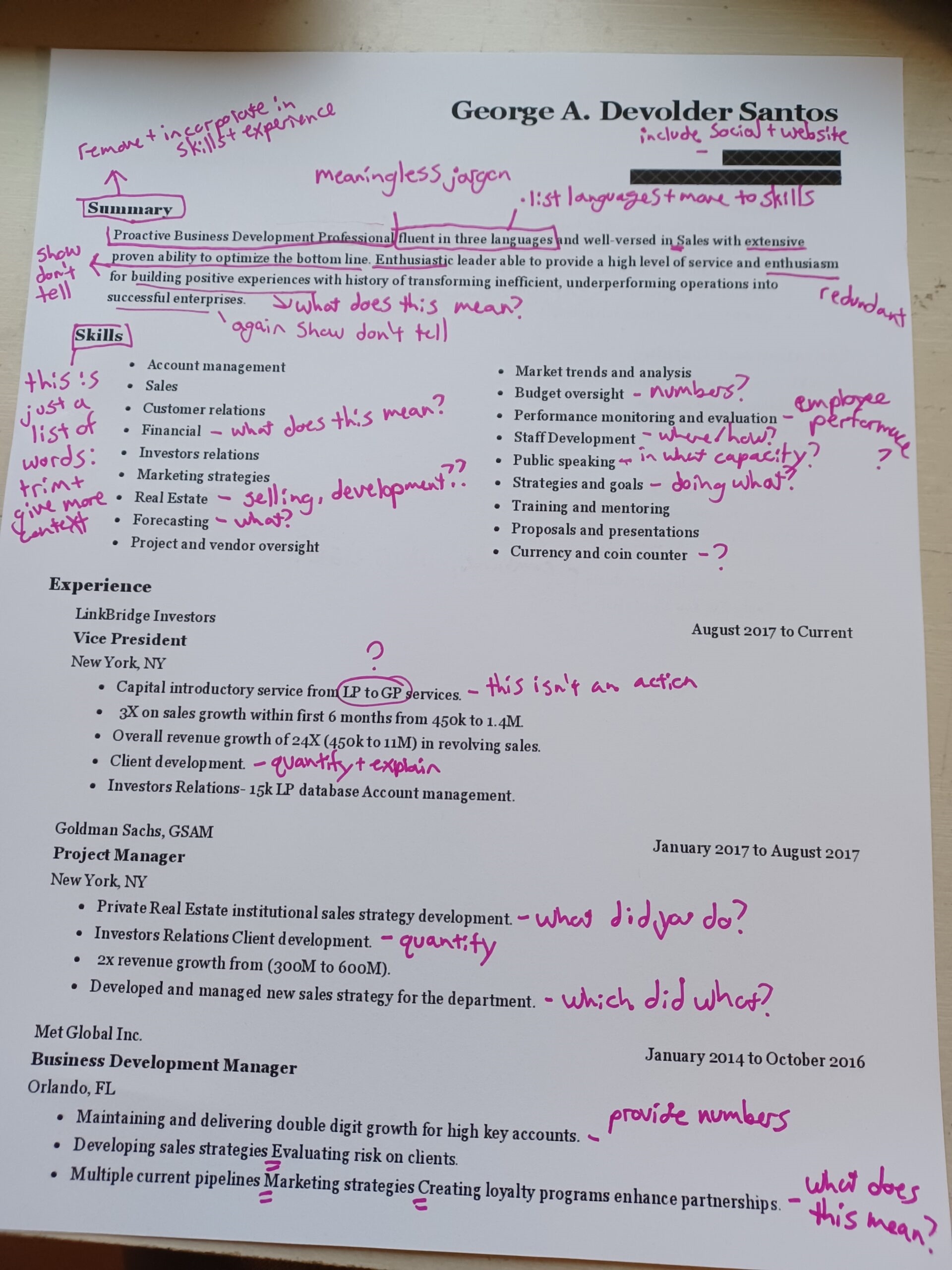New York congressman George Santos is facing increasing demands from both sides of the political aisle to resign after more revelations about the extent to which he has lied about his qualifications and background.
As part of the New York Times investigation, the publication obtained Santos’ résumé from 2020. The document contains seemingly impressive achievements, such as doubling revenue as a project manager at Goldman Sachs and graduating in the top 1% of class at Baruch College. It’s clear now that Santos’ ascent was built on a foundation of deceit, embellishment, and a lack of vetting. And while even a cursory background check could have revealed the falsehoods on his résumé, there are plenty of other mistakes.
In many ways, George Santos’ 2020 résumé is a masterclass in what not to do. Without delving into which parts are untrue and even setting aside the host of grammatical errors (what’s with all the random capitalization?), here are just a few things he should have done differently.

Lose the summary
Objective statements on résumés are useless, and summaries aren’t much better. The information included in a summary can usually be better detailed in the skills or experience sections. Santos exemplifies the worst habits in his summary statement:
Condense and give context to the skills section
I’ve hired for many positions over the years and edited dozens of articles on résumé advice. This is the most confounding list of skills I’ve ever seen. It reads as if he googled “business nouns.”
There are 18 bullet points with zero context. I have no clue what “real estate” means as a skill. Is it buying? Selling? Development? What he’s “forecasting” is anyone’s guess. What kind of “sales”? What kind of “public speaking”? “Budget oversight” of what size budgets, for what companies, in what capacity?
Most things on this list should be moved to the experience section and given context with more details, including numbers and impact. Generally, the skills section of a résumé is a good place to highlight things that aren’t covered in your job experience, like fluency in other languages, niche software knowledge, etc.
Finally, this list of words is all over the place. While it’s important to show that you are well-rounded, it’s useful to tailor your résumé to the job you are applying for and narrow down the skills you highlight.
Add context and detail to the experience section
It probably should have been a red flag for anyone reading this résumé that the bullet points under each position are so shockingly thin. Much like the skills section, there are a lot of meaningless phrases. A résumé is a condensed version of years of professional experience but condensing three years as a vice president down to a bullet point of “client development” strips out all meaning. The bullet points for each position are all over the place, contain random abbreviations, and are not written like achievements from a real person: “Capital introductory service from LP to GP services.”
It’s common advice to include numbers to help quantify your achievements, but even those Santos cited that appear most impressive—“revenue growth of 24x (450k to 11M) in revolving sales”—lack details and context into how they were achieved.

It’s a glaring red flag that the reader doesn’t have a good sense of what Santos’ role really entailed at any of the listed positions. Many of the bullet points feel incomplete: “Developed and managed new sales strategy”— which did what? “Delivering double digit growth for high key account”— how? What accounts? What are the numbers?
As the reader moves further down, the experience gets even more vague: “Multiple current pipelines Marketing strategies Creating loyalty programs enhance partnerships” reads as if it was written using Mad Libs.
And for someone who lists a lot of so-called soft skills like training, mentoring, staff and client development, there is a glaring lack of any of this important management experience under any of his roles.
Education is more than grades
If you (truly) got good grades in college, by all means list your GPA on your résumé. But listing a 3.89 GPA, and summa cum laude, and “ranked top 1% of class” is overkill. You should do more in college than get good grades (clubs, community involvement, awards). Besides, a decade after graduation, you should condense this section.
Whether you are looking for your first job after college, rebounding after a layoff or time out of the workforce, or hoping to make a career change, we have a large archive of résumé advice—and whatever you do, it’s never a good idea to embellish the truth.
If you want even more, I spoke to Fast Company editors Julia Herbst and AJ Hess about other common résumé mistakes on a recent episode of The New Way We Work.
(4)







